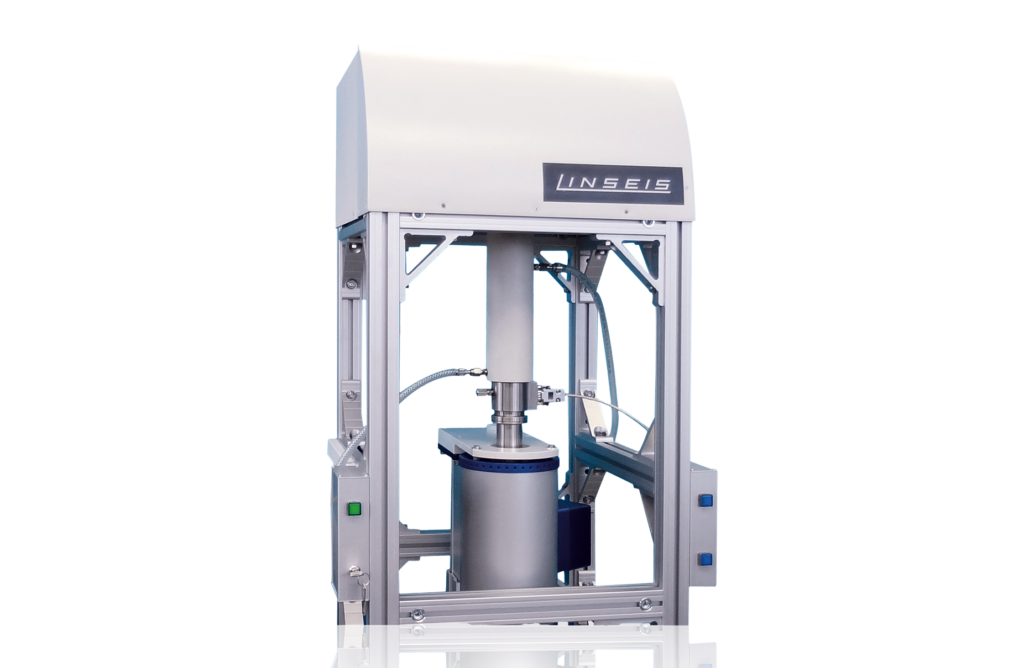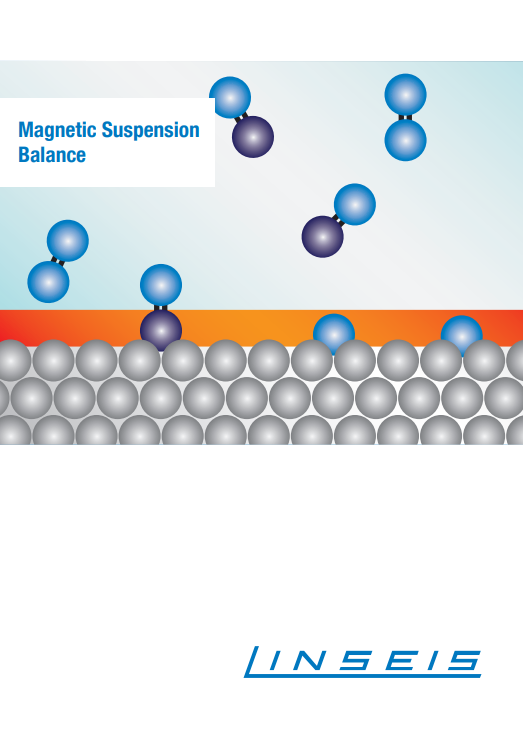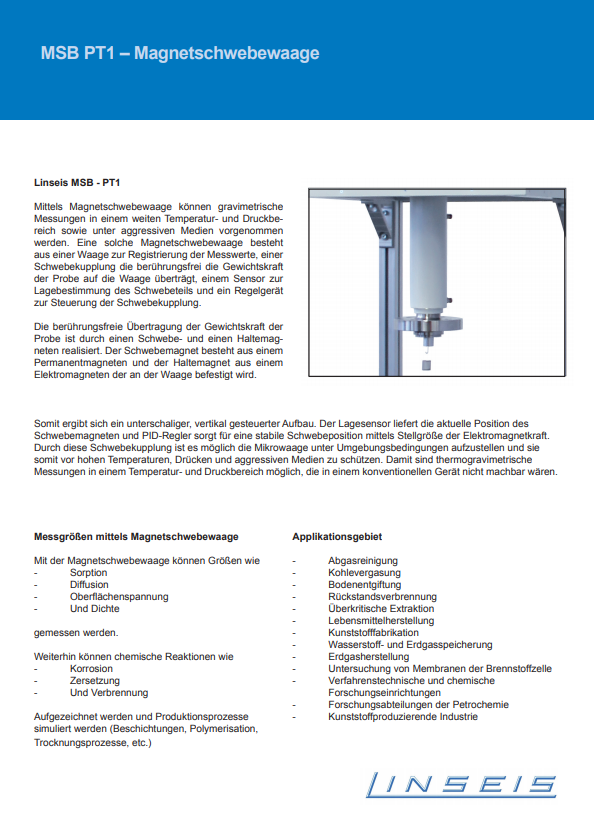Description
To the point
The LINSEIS MSB PT1 magnetic suspension balance can be used for gravimetric measurements in a wide temperature and pressure range, as well as in aggressive media.
Such a magnetic levitation balance consists of:
- a scale for recording the measured values
- a levitation clutch that transfers the weight of the sample to the balance without contact
- a sensor for determining the position of the levitation part and
- a control unit for controlling the levitation clutch
The contact-free transmission of the weight of the sample is realized by a levitating magnet and a holding magnet.
The levitation magnet consists of a permanent magnet and the holding magnet consists of an electromagnet that is attached to the scale.
This results in a vertically controlled structure.
The position sensor provides the current position of the levitation magnet and the PID controller ensures a stable levitation position by means of the electromagnetic force control variable.
This levitation clutch makes it possible to set up the microbalance under ambient conditions and thus protect it from high temperatures, pressures and aggressive media. This enables thermogravimetric measurements in a temperature and pressure range that would not be possible with a conventional device.
Unique features

Wide temperature range
High resolution
and accuracy
Modular design
Versatile application possibilities
Questions? We're just a call away!
+1 (609) 223 2040
+49 (0) 9287/880 0
Our service is available Monday to
Thursday from 8 am to 4 pm
and Friday from 8 am to 12 pm.
We are here for you!
Specifications
Black on white
Variants
There are many different variants to offer a suitable magnetic levitation scale for the respective application area.
The magnetic suspension scale is available in either a metal or glass version.
The glass version is mainly used for highly corrosive applications, whereas the metal version is required for high-pressure applications
Density
The density can also be determined with the magnetic suspension balance using the Archimedean buoyancy principle.
For this purpose, a weight with a known volume is weighed in the measuring fluid.
The density can be determined via the buoyancy of the respective sample.
The compact design of the magnetic levitation balance allows density measurements to be carried out over a wide temperature and pressure range.
Metal version
The metal version can be used for a wide range of applications.
Measurements of UHV up to 500bar in a temperature range from -196°C to 2400°C are possible.
Corrosive and toxic media can also be used for measurement.
This is made possible by appropriate coatings on the metal measuring cell.
Glass version
The glass version of the magnetic levitation balance is used for measuring highly corrosive media.
Sensitive parts inside the measuring cell, such as the levitation magnet and the iron core for the position sensor, are fused in glass.
The function of the levitation coupling and the automatic decoupling correspond to the metal version.
The possible application range is up to 900°C and a pressure of 1.3 bar.
MODEL | METAL VERSION |
|---|---|
| Temperature range: | -196 to 2400°C |
| Pressure range: | UHV - ultra-high vacuum up to 150bar |
| Sample weight: | 10 g (standard balance) |
| Resolution: | 1 ug |
| Gas analysis: | MS/FTIR |
| Option: | Special set-ups are also possible |
| *Special custom versions can be realised |
MODEL | GLASS VERSION |
|---|---|
| Temperature range: | up to 900°C |
| Pressure range: | Vacuum up to 1.3bar |
| Sample weight: | 10 g (standard scale) |
| Resolution: | 1 ug |
| Gas analysis: | MS/FTIR |
| Option: | Special set-ups are also possible |
| *Special custom versions can be realized |
Software
Making values visible and comparable
The powerful LINSEIS thermal analysis software, which is based on Microsoft® Windows®, performs the most important function in the preparation, execution and evaluation of thermoanalytical experiments, in addition to the hardware used.
With this software package, Linseis offers a comprehensive solution for programming all device-specific settings and control functions, as well as for data storage and evaluation.
The package was developed by our in-house software specialists and application experts and has been tried and tested over many years.

General functions
- Real-time color display
- Automatic and manual scaling
- Display of the axes freely selectable (e.g. temperature
e.g. temperature (x-axis) against delta L (y-axis)) - Mathematical calculations (e.g. first and second derivatives)
- Saving complete evaluations
- Multitasking function
- Multi-user function
- Zoom function for curve sections
- Any number of curves can be loaded on top of each other for comparison
- Online Help Menu
- Free labeling
- EXCEL® and ASCII export of measurement data
- Data smoothing
- Zero curves are offset
- Cursor function
- Statistical curve evaluation (mean value curve with confidence interval)
- Tabular printout of the data and expansion coefficients
- Calculation of Alpha Phys, Alpha Tech, relative expansion L/L0
- Curve arithmetic, addition, subtraction, multiplication
Applications
- Exhaust gas purification
- Coal gasification
- Soil detoxification
- Residue incineration
- Supercritical extraction
- Food production
- Plastics production
- Hydrogen and methane storage
- Methane synthesis
- Investigation of membranes (e.g. for fuel cells)
- Process engineering and chemical research facilities
- Research departments of the petrochemistry
- Polymer industry
Well informed


